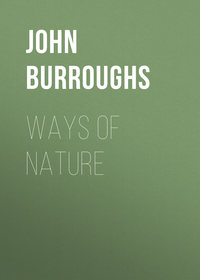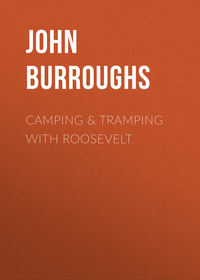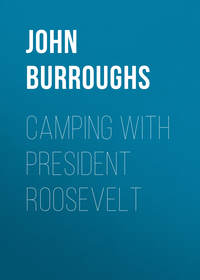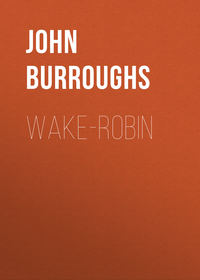 полная версия
полная версияWhitman: A Study
We hear nothing of the popular conception of the poet, well reflected in these lines of Tennyson: —
"The poet in a golden clime was born, with golden stars above.""Golden stars" and "golden climes" do not figure at all in Whitman's pages; the spirit of romance is sternly excluded.
Whitman's ideal poet is the most composite man, rich in temperament, rank in the human attributes, embracing races and eras in himself. All men see themselves in him: —
"The mechanic takes him for a mechanic,And the soldier supposes him to be a soldier, and the sailor that he has followed the sea,And the authors take him for an author, and the artists for an artist,And the laborers perceive he could labor with them and love them,No matter what the work is, that he is the one to follow it, or has followed it,No matter what the nation, that he might find his brothers and sisters there.······"The gentleman of perfect blood acknowledges his perfect blood,The insulter, the prostitute, the angry person, the beggar, see themselves in the ways of him, he strangelytransmutes them,They are not vile any more, they hardly know themselves they are so grown."Let us hold the poet to his own ideals, and not condemn him because he has not aimed at something foreign to himself.
The questions which Whitman puts to him who would be an American poet may fairly be put to himself.
"Are you faithful to things? Do you teach what the land and sea, the bodies of men, womanhood,amativeness, heroic angers, teach?Have you sped through fleeting customs, popularities?Can you hold your hand against all seductions, follies, whirls, fierce contentions? are you very strong?are you really of the whole people?Are you not of some coterie? some school, or mere religion?Are you done with reviews and criticisms of life? animating now to life itself?Have you vivified yourself from the maternity of these States?Have you, too, the old, ever-fresh forbearance and impartiality?······What is this you bring my America?Is it uniform with my country?Is it not something that has been better done or told before?Have you not imported this or the spirit of it in some ship?Is it not a mere tale? a rhyme? a pettiness? – is the good old cause in it?Has it not dangled long at the heels of the poets, politicians, literats of enemies' lands?Does it not assume that what is notoriously gone is still here?Does it answer universal needs? will it improve manners?Can your performance face the open fields and the seaside?Will it absorb into me as I absorb food, air, to appear again in my strength, gait, face?Have real employments contributed to it? Original makers, not mere amanuenses?So far as Whitman's poetry falls within any of the old divisions it is lyrical, – a personal and individual utterance. Open the book anywhere and you are face to face with a man. His eye is fixed upon you. It is a man's voice you hear, and it is directed to you. He is not elaborating a theme: he is suggesting a relation or hinting a meaning. He is not chiseling, or carving a work of art: he is roughly outlining a man; he is planting a seed, or tilling a field.
XXVI believe it was the lamented Professor Clifford who first used the term "cosmic emotion" in connection with "Leaves of Grass." Whitman's atmosphere is so distinctly outside of and above that which ministers to our social and domestic wants, – the confined and perfumed air of an indoor life; his mood and temper are so habitually begotten by the contemplation of the orbs and the laws and processes of universal nature, that the phrase often comes to mind in considering him. He is not in any sense, except perhaps in a few minor pieces, a domestic and fireside poet, – a solace to our social instincts and cultivated ideals. He is too large, too aboriginal, too elemental, too strong for that. I seem to understand and appreciate him best when I keep in mind the earth as a whole, and its relation to the system. Any large view or thought, or survey of life or mankind, is a preparation for him. He demands the outdoor temper and habit, he demands a sense of space and power, he demands above all things a feeling for reality. "Vastness" is a word that applies to him; abysmal man, cosmic consciousness, the standards of the natural universal, – all hint some phase of his genius. His survey of life and duty is from a point not included in any four walls, or in any school or convention. It is a survey from out the depths of being; the breath of worlds and systems is in these utterances. His treatment of sex, of comradeship, of death, of democracy, of religion, of art, of immortality, is in the spirit of the great out-of-doors of the universe; the point of view is cosmic rather than personal or philanthropic. What charity is this! – the charity of sunlight that spares nothing and turns away from nothing. What "heroic nudity"! like the nakedness of rocks and winter trees. What sexuality! like the lust of spring or the push of tides. What welcome to death, as only the night which proves the day!
XXVIThis orbic nature which so thrills and fills Whitman is not at all akin to that which we get in the so-called nature-poets of Wordsworth and his school, – the charm of privacy, of the sequestered, the cosy, – qualities that belong to the art of a domestic, home-loving race, and to lovers of solitude. Tennyson's poetry abounds in these qualities; so does Wordsworth's. There is less of them in Browning, and more of them in the younger poets. That communing with nature, those dear friendships with birds and flowers, that gentle wooing of the wild and sylvan, that flavor of the rural, the bucolic, – all these are important features in the current popular poetry, but they are not to any marked extent characteristic of Whitman. The sentiment of domesticity, love as a sentiment; the attraction of children, home and fireside; the attraction of books, art, travel; our pleasure in the choice, the refined, the artificial, – these are not the things you are to demand of Whitman. You do not demand them of Homer or Dante or the Biblical writers. We are to demand of him the major things, primary things; the lift of great emotions; the cosmic, the universal; the joy of health, of selfhood; the stimulus of the real, the modern, the American; always the large, the virile; always perfect acceptance and triumph.
Whitman's free use of the speech of the common people is doubtless offensive to a fastidious literary taste. Such phrases as "I will be even with you," "what would it amount to," "give in," "not one jot less;" "young fellows," "old fellows," "stuck up," "every bit as much," "week in and week out," and a thousand others, would jar on the page of any other poet more than on his.
XXVIIWilliam Rossetti says his language has a certain ultimate quality. Another critic speaks of his absolute use of language. Colonel Ingersoll credits him with more supreme words than have been uttered by any other man of our time.
The power to use words was in Whitman's eyes a divine power, and was bought with a price: —
"For only at last after many years, after chastity, friendship, procreation, prudence, and nakedness,After treading ground, and breasting river and lake,After a loosen'd throat, after absorbing eras, temperaments, races, after knowledge, freedom, crimes,After complete faith, after clarifying elevations and removing obstructions,After these and more, it is just possible there comes to a man, a woman, the divine power to speak words."Whitman's sense of composition and his rare artistic faculty of using language are seen, as John Addington Symonds says, in the "countless clear and perfect phrases" "which are hung, like golden medals of consummate workmanship and incised form, in rich clusters over every poem he produced. And, what he aimed at above all, these phrases are redolent of the very spirit of the emotions they suggest, communicate the breadth and largeness of the natural things they indicate, embody the essence of realities in living words which palpitate and burn forever."
The great poet is always more or less the original, the abysmal man. He is face to face with universal laws and conditions. He speaks out of a greater exaltation of sentiment than the prose-writer. He takes liberties; he speaks for all men; he is a bird on "pinions free."
XXVIIIIn saying or implying that Whitman's aim was not primarily literary or artistic, I am liable to be misunderstood; and when Whitman himself says, "No one will get at my verses who insists upon viewing them as a literary performance, or attempt at such performance, or as aiming mainly toward art or æstheticism," he exposes himself to the same misconception. It is the literary and poetic value of his verses alone that can save them. Their philosophy, their democracy, their vehement patriotism, their religious ardor, their spirit of comradeship, or what not, will not alone suffice. All depends upon the manner in which these things are presented to us. Do we get the reality, or words about the reality? No matter what the content of the verse, unless into the whole is breathed the breath of the true creative artist they will surely perish. Oblivion awaits every utterance not touched with the life of the spirit. Whitman was as essentially an artist as was Shakespeare or Dante; his work shows the same fusion of imagination, will, emotion, personality; it carries the same quality of real things, – not the same shaping, constructive power, but the same quickening, stimulating power, the same magic use of words. The artist in him is less conscious of itself, is less differentiated from the man, than in the other poets. He objected to having his work estimated for its literary value alone, but in so doing he used the word in a narrow sense.
After all these ages of the assiduous cultivation of literature, there has grown up in men a kind of lust of the mere art of writing, just as, after so many generations of religious training, there has grown up a passion for religious forms and observances. "Mere literature" has come to be a current phrase in criticism, meaning, I suppose, that the production to which it is applied is notable only for good craftsmanship. In the same spirit one speaks of mere scholarship, or of a certain type of man as a mere gentleman. It was mere literature that Whitman was afraid of, the æsthetic disease, the passion for letters, for poetry, divorced from love of life and of things. None knew better than he that the ultimate value of any imaginative and emotional work, even of the Bible, is its literary value. Its spiritual and religious value is inseparably connected with its literary value.
"Leaves of Grass" is not bookish; it is always the voice of a man, and not of a scholar or conventional poet, that addresses us. We all imbue words more or less with meanings of our own; but, from the point of view I am now essaying, literature is the largest fact, and embraces all inspired utterances. The hymn-book seeks to embody or awaken religious emotion alone; would its religious value be less if its poetic value were more? I think not. The best of the Psalms of David, from the religious point of view, are the best from the literary point of view. What reaches and thrills the soul, – that is great art. What arouses the passions – mirth, anger, indignation, pity – may or may not be true art. No one, for instance, can read "Uncle Tom's Cabin" without tears, laughter, anger; but no one, I fancy, could ever get from it that deep, tranquil pleasure and edification that the great imaginative works impart. Keble's poetry is more obviously religious than Wordsworth's or Arnold's, but how short-lived, because it is not embalmed in the true artistic spirit! In all the great poems, there is something as deep and calm as the light and the sky, and as common and universal. I find this something in Whitman. In saying, therefore, that his aim was ulterior to that of art, that he was not begotten by the literary spirit, I only mean that his aim was that of the largest art, and of the most vital and comprehensive literature. We should have heard the last of his "Leaves" long ago had they not possessed unmistakably the vitality of true literature, "incomparable things, incomparably well said," as Emerson remarked.
A scientific or philosophical work lives independently of its literary merit, but an emotional and imaginative work lives only by virtue of its literary merit. Different meanings may be attached to these words "literary merit" by different persons. I use them as meaning that vital and imaginative use of language which is the characteristic of all true literature. The most effective way of saying a thing in the region of the sentiments and emotions, – that is the true literary way.
HIS RELATION TO LIFE AND MORALS
II have divided my subject into many chapters, and given to each a separate heading, yet I am aware that they are all but slight variations of a single theme, – viz., Whitman's reliance upon absolute nature. That there might be no mistake about it, and that his reader might at once be put in possession of his point of view, the poet declared at the outset of his career that at every hazard he should let nature speak.
"Creeds and schools in abeyanceRetiring back awhile, sufficed at what they are, but never forgotten,I harbor for good or bad,I permit to speak at every hazard,Nature without check, with original energy."The hazard of letting nature speak will, of course, be great, – the hazard of gross misapprehension on the part of the public, and of hesitancy and inadequacy on the part of the poet. The latter danger, I think, was safely passed; Whitman never flinched or wavered for a moment, and that his criticism is adequate seems to me equally obvious. But the former contingency – the gross misapprehension of the public, even the wiser public – has been astounding. He has been read in a narrow, literal, bourgeois spirit. The personal pronoun, which he uses so freely, has been taken to stand for the private individual Walt Whitman, so that he has been looked upon as a compound of egotism and licentiousness. His character has been traduced, and his purpose in the "Leaves" entirely misunderstood.
We see at a glance that his attitude towards nature, towards God, towards the body and the soul, reverses many of the old ascetic theological conceptions.
All is good, all is as it should be; to abase the body is to abase the soul. Man is divine inside and out, and is no more divine about the head than about the loins. It is from this point of view that he has launched his work. He believed the time had come for an utterance out of radical, uncompromising human nature; let conventions and refinements stand back, let nature, let the soul, let the elemental forces speak; let the body, the passions, sex, be exalted; the stone rejected by the builders shall be the chief stone in the corner. Evil shall be shown to be a part of the good, and death shall be welcomed as joyously as life.
Whitman says his poems will do just as much evil as good, and perhaps more. To many readers this confession of itself would be his condemnation. To others it would be an evidence of his candor and breadth of view. I suppose all great vital forces, whether embodied in a man or in a book, work evil as well as good. If they do not, they only tickle the surface of things. Has not the Bible worked evil also? Some think more evil than good. The dews and the rains and the sunshine work evil.
From Whitman's point of view, there is no good without evil; evil is an unripe kind of good. There is no light without darkness, no life without death, no growth without pain and struggle. Beware the emasculated good, the good by exclusion rather than by victory. "Leaves of Grass" will work evil on evil minds, – on narrow, unbalanced minds. It is not a guide, but an inspiration; not a remedy, but health and strength. Art does not preach directly, but indirectly; it is moral by its spirit, and the mood and temper it begets.
Whitman, in celebrating manly pride, self-reliance, the deliciousness of sex; in glorifying the body, the natural passions and appetites, nativity; in identifying himself with criminals and low or lewd persons; in frankly imputing to himself all sins men are guilty of, runs the risk, of course, of being read in a spirit less generous and redemptive than his own.
The charity of the poet may stimulate the license of the libertine; the optimism of the seer may confirm the evil-doer; the equality of the democrat may foster the insolence of the rowdy. This is our lookout and not the poet's. We take the same chances with him that we do with nature; we are to trim our sails to the breeze he brings; we are to sow wheat and not tares for his rains to water.
Whitman's glorification of the body has led some critics to say that he is the poet of the body only. But it is just as true to say he is the poet of the soul only. He always seeks the spiritual through the material. He treats the body and the soul as one, and he treats all things as having reference to the soul.
"I will not make a poem, nor the least part, of a poem, but has reference to the soul,Because, having look'd at the objects of the universe, I find there is no one, nor any particle of one,but has reference to the soul."The curious physiological strain which runs through the poems is to be considered in the light of this idea. He exalts the body because in doing so he exalts the soul.
"Sure as the earth swims through the heavens, does every one of its objects pass into spiritual results."IIThe reader of Whitman must do his or her own moralizing; the poet is here not to deprecate or criticise, but to love and celebrate; he has no partialities; our notions of morality do not concern him; he exploits the average man just as he finds him; he is the average man for the time being and confesses to all his sins and shortcomings, and we will make of the result good or evil, according to our mental horizon. That his work is unmixed good is the last thing the poet would claim for it. He has not, after the easy fashion of the moralist, set the good here and the bad there; he has blended them as they are in nature and in life; our profit and discipline begin when we have found out whither he finally tends, or when we have mastered him and extracted the good he holds. If we expect he is going to preach an austere system of morality to us, or any system of morality, we are doomed to disappointment. Does Nature preach such a system? does Nature preach at all? neither will he. He presents you the elements of good and evil in himself in vital fusion and play; your part is to see how the totals are at last good.
It is objected that Whitman is too persistent in declaring himself an animal, when the thing a man is least likely to forget is that he is an animal and the thing he is least likely to remember is that he is a spirit and a child of God. But Whitman insists with the same determination that he is a spirit and an heir of immortality, – not as one who has cheated the devil of his due, but as one who shares the privileges and felicities of all, and who finds the divine in the human. Indeed it is here that he sounds his most joyous and triumphant note. No such faith in spiritual results, no such conviction of the truth of immortality, no such determined recognition of the unseen world as the final reality is to be found in modern poetry.
As I have said, Whitman aimed to put his whole nature in a poem – the physical or physiological, the spiritual, the æsthetic and intellectual, – without giving any undue prominence to either. If he has not done so, if he has made the animal and sexual too pronounced, more so than nature will justify in the best proportioned man, then and then only is his artistic scheme vitiated and his work truly immoral.
It may be true that the thing a man is least likely to forget is that he is an animal; what he is most likely to forget, is that the animal is just as sacred and important as any other part; indeed that it is the basis of all, and that a sane and healthful and powerful spirituality and intellectuality can only flow out of a sane and healthful animality.
"I believe in you, my soul, the other I am must not abase itself to you,And you must not be abased to the other."IIIFurthermore, Whitman's main problem is to project into literature the new democratic man as he conceives him, – the man of the future, intensely American, but in the broadest sense human and cosmopolitan; he is to project him on a scale large enough for all uses and conditions, ignoring the feudal and aristocratic types which have for the most part dominated literature, and matching them with a type more copious in friendship, charity, sympathy, religion, candor, and of equal egoism and power.
It is to exploit and enforce and illustrate this type or character that "Leaves of Grass" is written. The poems are the drama of this new democratic man. This type Whitman finds in himself. He does not have to create it as Shakespeare did Hamlet or Lear; he has only to discover it in himself. He is it and he gives it free utterance. His work is, therefore, as he says, the poem of himself, – himself written large, – written as upon the face of the continent, written in the types and events he finds on all sides. He sees himself in all men, the bad as well as the good, and he sees all men in himself. All the stupendous claims he makes for himself he makes for others. His egotism is vicarious and embraces the world. It is not the private individual Walt Whitman that makes these stupendous claims for himself; it is Walt Whitman as the spokesman of the genius of American democracy. He is not to discuss a question. He is to outline a character, he is to incarnate a principle. The essayist or philosopher may discuss the value of any given idea, – may talk about it; the creative artist alone can give us the thing itself, the concrete flesh-and-blood reality. Whitman is not only to make this survey, to launch this criticism; he is to embody it in a living human personality, and enable us to see the world of man and morals through its eyes. What with the scientist, the philosopher, is thought, must be emotion and passion with him.
Whitman promises that we shall share with him "two greatnesses, and a third one rising inclusive and more resplendent," —
"The greatness of Love and Democracy and the greatness of Religion" —not merely as ideas, but as living impulses. He is to show the spirit of absolute, impartial nature, incarnated in a human being, imbued with love, democracy, and religion, moving amid the scenes and events of the New World, sounding all the joys and abandonments of life, and re-reading the oracles from the American point of view. And the utterance launched forth is to be imbued with poetic passion.
Whitman always aims at a complete human synthesis, and leaves his reader to make of it what he can. It is not for the poet to qualify and explain. He seeks to reproduce his whole nature in a book, – reproduce it with all its contradictions and carnalities, the good and the bad, the coarse and the fine, the body and the soul, – to give free swing to himself, trusting to natural checks and compensations to ensure a good result at last, but not at all disturbed if you find parts of it bad as in creation itself.
His method being that of the poet, and not that of the moralist or preacher, how shall he sort and sift, culling this virtue and that, giving parts and fragments instead of the entire man? He must give all, not abstractly, but concretely, synthetically.
To a common prostitute Whitman says: —
"Not till the sun excludes you do I exclude you;Not till the waters refuse to glisten for you, and the leaves to rustle for you, do my words refuse toglisten and rustle for you."We are housed in social usages and laws, we are sheltered and warmed and comforted by conventions and institutions and numberless traditions; their value no one disputes. But for purposes of his own Whitman ignores them all; he lets in upon us the free and maybe raw air of the great out-of-doors of absolute nature; his standards are not found inside of any four walls; he contemplates life, and would quicken it in its fundamentals; his survey is from a plane whence our arts and refinements and petty distinctions disappear. He sees the evil of the world no less necessary than the good; he sees death as a part of life itself; he sees the body and the soul as one; he sees the spiritual always issuing from the material; he sees not one result at last lamentable in the universe.
IVUnless, as I have already said, we allow Whitman to be a law unto himself, we can make little of him; unless we place ourselves at his absolute point of view, his work is an offense and without meaning. The only question is, Has he a law, has he a steady and rational point of view, is his work a consistent and well-organized whole? Ask yourself, What is the point of view of absolute, uncompromising science? It is that creation is all good and sound; things are as they should be or must be; there are no conceivable failures; there is no evil in the final analysis, or, if there is, it is necessary, and plays its part also; there is no more beginning nor ending than there is now, no more heaven or hell than we find or make here: —









